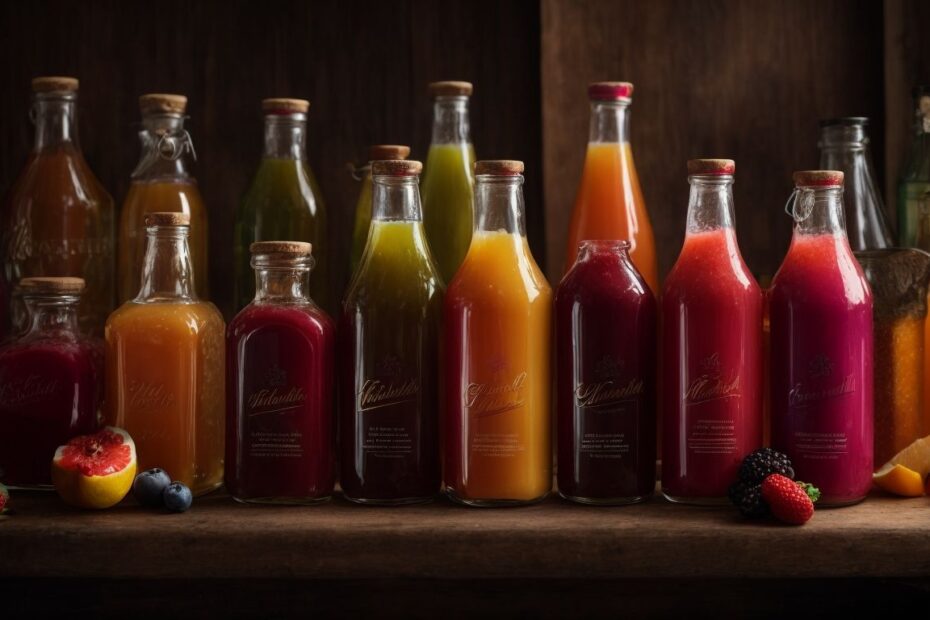Fermented fruit juices have been gaining popularity in recent years, and for good reason. Not only do they offer a delicious and refreshing alternative to traditional fruit juices, but they also provide a range of health benefits that can enhance your overall well-being.
In this article, we will explore the process of fermenting fruit juices, the benefits of consuming them, and the different types of fermented fruit juices that you need to try. From the selection of fruits to the fermentation process and the specific health benefits, we will cover everything you need to know about this trending health trend.
So, if you’re curious about what fermented fruit juices are all about and want to expand your knowledge of these exciting beverage options, read on to discover more about these 10 fermented fruit juices that you need to try now.
What Are Fermented Fruit Juices?
Fermented fruit juices are natural drinks that undergo a fermentation process, resulting in delicious flavors and a variety of probiotics that contribute to gut health.
These beverages are created through the natural conversion of sugars into alcohols and acids by yeast and bacteria. This process not only enhances the taste of the fruits but also leads to the formation of probiotics, which are beneficial microorganisms for the digestive system.
The diverse range of fruits used in fermentation, such as apples, berries, and citrus, yields a wide array of flavors, making fermented fruit juices a refreshing and healthy alternative to sugary drinks.
What is the Process of Fermenting Fruit Juices?
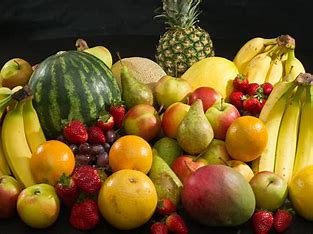
The process of fermenting fruit juices involves:
- Selecting the right fruits
- Extracting the juice
- Adding a starter culture
- Managing the fermentation process using specialized vessels and equipment
Once the fruits are carefully selected, they are washed and processed to extract the juice. The juice is then combined with a starter culture, typically consisting of yeast or bacteria, to kick-start the fermentation process. This mixture is then transferred into fermentation vessels, such as glass jars or fermentation crocks, where it undergoes controlled fermentation for a specific period.
Throughout the fermentation, monitoring and adjusting temperature, acidity, and other conditions are crucial for the successful transformation of the juice into a delicious fermented beverage.
Choosing The Right Fruits
Choosing the right fruits is crucial for fermenting fruit juices, as a diverse variety ensures the creation of flavorful and nutritious fermented recipes.
Different fruits bring unique characteristics to the fermentation process, influencing the overall taste, aroma, and nutritional content. For example, berries can impart a vibrant color and tartness, while tropical fruits add a sweet, exotic flair. Incorporating a mix of fruits also contributes to a well-rounded flavor profile. Selecting ripe, quality fruits is essential for the success of fermentation, as they offer a higher natural sugar content required for the fermentation process. Attention to fruit selection lays the foundation for crafting exceptional fermented beverages and preserves.
Extracting The Juice
Extracting the juice from selected fruits is a key step in fermenting fruit juices, ensuring the creation of homemade, natural recipes that embody the essence of the fruits.
This process starts with carefully selecting the ripest and freshest fruits, as their flavors and natural sugars are essential for fermentation. Once the fruits have been chosen, they are washed and prepared before being juiced. Some recipes might call for the fruits to be crushed or mashed to release their juices fully. The resulting pure fruit juice, free from additives or preservatives, serves as the foundation for a range of delightful fermented drinks, from tangy ciders to effervescent fruit wines.
Adding A Starter Culture
Adding a starter culture to the extracted fruit juice initiates the fermentation process, allowing the development of unique fermentation recipes that embody the culture’s characteristics.
The selection of a specific fermentation culture significantly influences the flavor, aroma, and overall composition of the fermented fruit juice. By introducing the starter culture, the fermentation process becomes controlled, where the culture’s microorganisms transform the sugars in the fruit juice into alcohol and other flavor compounds. This plays a pivotal role in shaping the distinct qualities and complexity of the final product, contributing to the richness and depth of the fermented fruit juice. Ultimately, the starter culture is an essential component in creating diverse and flavorful fermented fruit juice recipes.
Fermentation Process
The fermentation process for fruit juices involves managing the fermentation vessel and airlock, allowing sufficient fermentation time for the development of rich flavors and probiotics.
This process typically occurs in specialized fermentation vessels, such as glass jars or ceramic crocks, which provide a controlled environment for the fermentation to take place. It is essential to monitor the airlock, ensuring that the gases produced during fermentation can escape while preventing outside air from entering.
The duration of the fermentation time is crucial in determining the depth and complexity of flavors in the juice, with longer fermentation periods resulting in a more pronounced and developed taste profile. The impact of fermentation vessels and fermentation time management is pivotal in shaping the final flavor of the product, as it allows for the intricate interactions between microorganisms and the juice to take place.
What Are the Benefits of Drinking Fermented Fruit Juices?

Drinking fermented fruit juices offers numerous health benefits, including improved gut health, enhanced nutrient absorption, and the intake of beneficial probiotics.
These fermented beverages provide a natural source of probiotics that can aid in maintaining a healthy balance of gut bacteria. The fermentation process breaks down nutrients in the fruits, making them more easily absorbable by the body. With regular consumption, fermented fruit juices can contribute to overall digestive wellness and may even boost the immune system. The presence of beneficial enzymes in these juices further supports optimal digestion and overall well-being.
Increases Nutrient Absorption
Consuming fermented fruit juices increases nutrient absorption, allowing the body to derive enhanced health benefits from the ingested nutrients.
This improved absorption is attributed to the enzymes and probiotics present in fermented fruit juices. The fermentation process breaks down complex nutrients, making them easier for the body to absorb. As a result, individuals who regularly consume fermented fruit juices may experience increased energy levels, improved digestion, and strengthened immunity. The enhanced nutrient assimilation can positively impact overall health, contributing to better skin health, cognitive function, and overall well-being.
Incorporating fermented fruit juices into the diet can lead to improved nutrient absorption and better overall health outcomes.
Improves Digestion
Regular consumption of fermented fruit juices contributes to improved digestion, promotes a healthy balance of gut bacteria and supports the body’s natural fermentation processes.
These fermented fruit juices are packed with probiotics, which are beneficial bacteria known to aid digestion and enhance gut health. Probiotics help to break down food and absorb nutrients, reducing digestive discomfort and promoting regular bowel movements.
Fermented fruit juices contain enzymes that can further assist in the digestion process, making it easier for the body to absorb essential nutrients. This combination of probiotics and enzymes can contribute to a healthier gut microbiome, supporting overall well-being.
Boosts Immune System
The consumption of fermented fruit juices contributes to the boosting of the immune system, thanks to the presence of beneficial probiotics and their positive impact on overall health.
These probiotics play a crucial role in supporting the body’s natural defense mechanisms, helping to ward off harmful pathogens and maintain a balanced immune response. Research has shown that the regular intake of probiotic-rich foods, such as fermented fruit juices, can strengthen the immune system, reducing the risk of infections and promoting better overall well-being.
By nurturing a healthy gut microbiome, probiotics contribute to the enhancement of immune function, making fermented fruit juices a valuable addition to a wholesome diet for immune support.
Promotes Detoxification
Fermented fruit juices play a role in promoting natural detoxification processes in the body, contributing to overall health and well-being.
These juices are teeming with beneficial enzymes, probiotics, and antioxidants that support the body’s detoxification pathways. By consuming fermented fruit juices, individuals can enhance their digestive health, improve nutrient absorption, and bolster their immune system.
The natural probiotics found in these juices help restore the balance of healthy gut bacteria, which is crucial for detoxification and overall wellness. The gentle acidity of fermented fruit juices also aids in cleansing the system and promoting a healthy pH balance within the body.
What Are the Different Types of Fermented Fruit Juices?
The world of fermented fruit juices encompasses a diverse array of types, including kombucha, kefir, cider, and an assortment of fruit-based recipes such as pineapple, strawberry, mango, blueberry, and raspberry.
These fermented fruit beverages offer a delightful blend of tangy and sweet flavors, catering to diverse taste preferences.
Kombucha, a fizzy, tea-based drink, is known for its probiotic benefits and is often infused with flavors like ginger or hibiscus.
Kefir, on the other hand, originates from fermented milk but is also popular in non-dairy variations, featuring an effervescent texture and a slight tang.
Cider, crafted from fermented apple juice, comes in an array of variations, including dry, sweet, and spiced options, while fruit-specific fermentations introduce a whole new world of unique and refreshing flavor profiles.
1. Kombucha
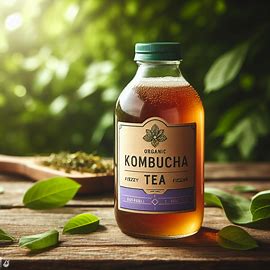
Kombucha stands as a renowned fermented fruit juice, offering unique health benefits and a distinct recipe that appeals to health-conscious individuals seeking flavorful probiotic options.
This ancient elixir has gained popularity for its tangy, effervescent nature and is known for its rich concentration of beneficial probiotics, enzymes, and organic acids. Embracing its roots in traditional Chinese medicine, kombucha’s fermentation process involves a synergy of live cultures, creating a myriad of health-enhancing properties, such as boosting gut health, improving digestion, and supporting the immune system. Its antioxidant properties contribute to detoxification and promote overall well-being.
2. Kefir
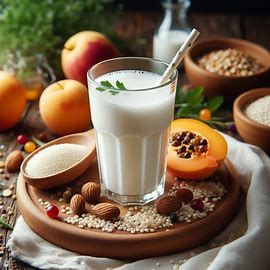
Kefir is a cultured and fermented fruit juice known for its beneficial impact on gut bacteria and overall health, making it a popular choice among health enthusiasts.
Rich in probiotics, kefir offers an array of health benefits, including improved digestion, a strengthened immune system, and better nutrient absorption. The fermentation process enhances the bioavailability of key nutrients, such as vitamins and minerals, aiding in overall wellness.
Kefir’s diverse microbial composition supports a balanced gut flora, contributing to better gastrointestinal health and potentially alleviating digestive issues. Its tangy, refreshing flavor makes it a versatile addition to smoothies, dressings, and desserts, adding a probiotic boost to everyday meals.
3. Apple Cider Vinegar

Apple cider vinegar, as a fermented fruit juice, offers a natural and tangy recipe that is widely recognized for its potential health and culinary benefits.
It is derived from crushed apples, which undergo a fermentation process to convert the sugars into acetic acid, giving it a characteristic sour flavor. This versatile vinegar is celebrated for its role in salad dressings, marinades, and pickling, as well as for its potential health properties, including aiding digestion, promoting skin health, and supporting weight management. Its natural acidity also makes it a key ingredient in a variety of natural cleaning and disinfecting recipes.
4. Jun Tea

Jun tea represents a unique fermented fruit juice with an assortment of flavors and potential health benefits, making it an intriguing option for those seeking diverse fermentation recipes.
The recipe for Jun tea typically involves fermenting green tea and honey, resulting in a delightful blend of sweet and tangy flavors. This fermentation process also introduces beneficial probiotics and antioxidants, which may support gut health and provide a natural energy boost.
Jun tea’s low caffeine content makes it an ideal alternative to traditional caffeinated beverages for individuals looking to reduce their intake. With its refreshing taste and potential health-enhancing properties, Jun tea has garnered attention as a promising addition to a balanced diet.
5. Water Kefir

Water kefir, a fermented fruit juice, offers an array of flavors and probiotics that cater to individuals seeking refreshing and nutritious beverage options.
The diverse flavors of water kefir, from tangy citrus to sweet berries, provide a delightful range of tastes to tantalize the palate. Its probiotic content contributes to gut health, making it an attractive choice for those interested in boosting their digestive well-being.
As a low-sugar alternative to sodas and artificially sweetened drinks, water kefir stands out for its natural sweetness and nutritional richness, making it a popular choice for health enthusiasts who prioritize wellness and flavor in their beverage selections.
6. Beet Kvass
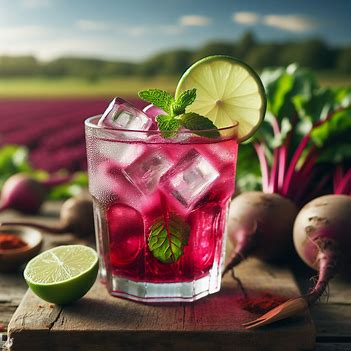
Beet kvass, a fermented fruit juice, offers a unique recipe and potential health benefits, making it an intriguing option for those seeking a distinctive fermentation experience.
With its deep, earthy flavor and vibrant hue, beet kvass brings a refreshing twist to the world of fermented beverages. The fermentation process converts the natural sugars in beets into beneficial probiotics, making it a probiotic-rich drink renowned for its digestive health benefits. Beet kvass is packed with essential nutrients, including vitamin C, folate, and potassium, which contribute to its potential to support immune function and overall wellness. Its natural tang and effervescence add a delightful zing to any beverage lineup, making it a must-try for those interested in exploring the world of fermented foods.
7. Ginger Beer

Ginger beer, as a fermented fruit juice, offers a spicy and effervescent recipe that resonates with aficionados of unique fermentation equipment and diverse flavors.
Its bold and zesty flavor profile, derived from the fermentation of ginger root and sugar, makes it a favorite among those who appreciate the complexity of fermented beverages. The unique fermentation process creates a satisfying fizz and a delightful tanginess that sets ginger beer apart from other traditional beverages. Enthusiasts of distinct fermentation equipment are drawn to its artisanal appeal and enjoy experimenting with different brewing methods to achieve the perfect balance of sweetness and spiciness.
8. Pineapple Vinegar
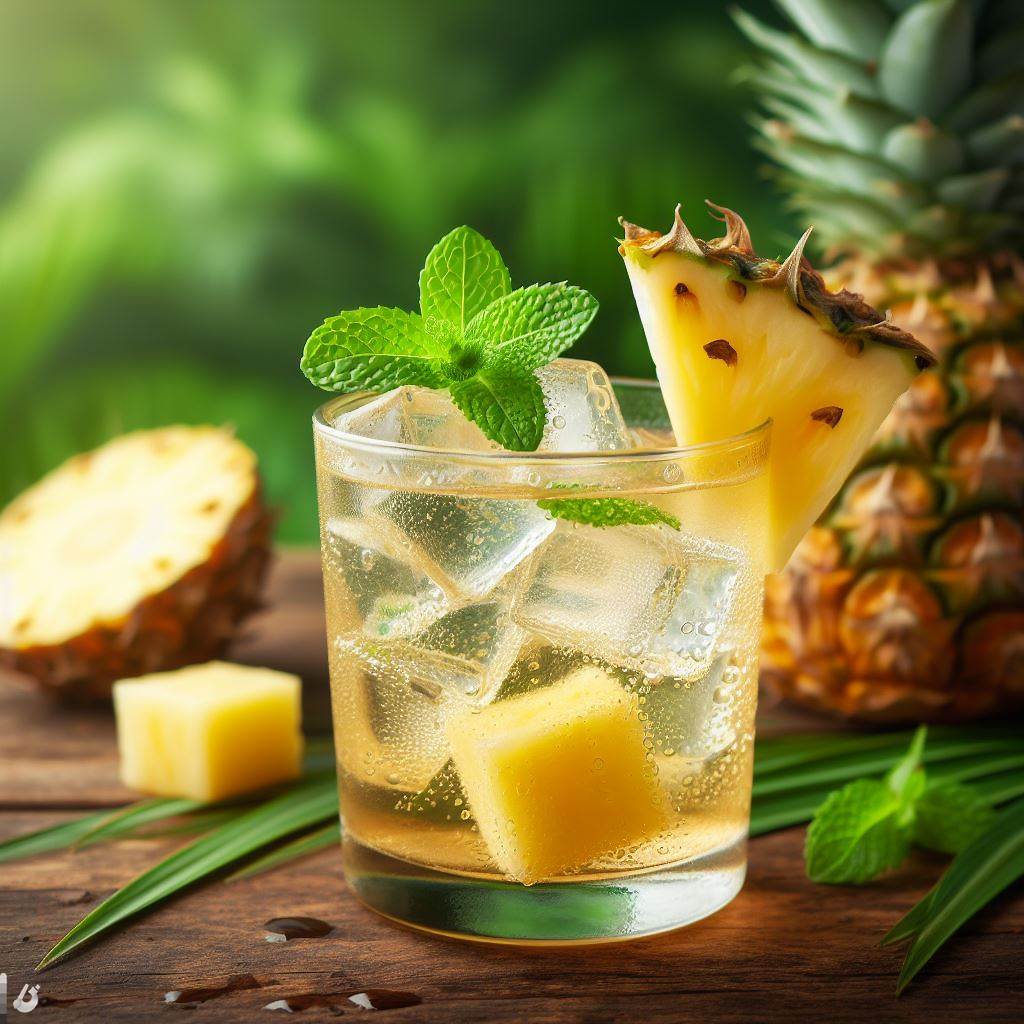
Pineapple vinegar, as a fermented fruit juice, offers a delightful burst of tropical flavors and numerous potential health benefits.
This versatile vinegar is known for its natural properties, including its high levels of antioxidants, enzymes, and beneficial bacteria that can support digestion and gut health. Beyond its health benefits, pineapple vinegar is a popular ingredient in natural recipes, adding a tangy sweetness to salad dressings, marinades, and sauces. Its vibrant tropical flavor profile also makes it a great addition to refreshing beverages and fruit-based desserts. Whether used in cooking or consumed for its potential health benefits, pineapple vinegar is a dynamic culinary ingredient that adds a burst of fruity brightness to dishes.
9. Wine

Wine, as a fermented fruit juice, boasts a rich history and diverse flavors that stem from the intricate fermentation process, making it a staple in homemade fermentation recipes.
Its roots trace back to ancient civilizations such as the Greeks and Romans, who mastered the art of winemaking. The fermentation process involves the conversion of grape sugars into alcohol by yeast, resulting in the distinctive flavors and aromas that wine enthusiasts cherish. Whether it’s the bold notes of a Cabernet Sauvignon or the delicate nuances of a Chardonnay, each wine tells a story of its own, reflecting the unique characteristics of the grapes and the skilled craftsmanship of winemakers.
10. Hard Cider

Hard cider offers a potent and flavorful fermented fruit juice, often crafted using specialized fermentation containers to achieve a distinct and well-balanced recipe.
The fermentation process of hard cider is unique, as it involves the conversion of sugars in the fruit juice into alcohol and carbon dioxide by yeast. This results in the creation of the distinct flavors that characterize different types of hard cider.
The use of specialized containers, such as wooden barrels or stainless steel tanks, can impart specific qualities to the cider, enhancing its taste and aroma. These containers also play a vital role in controlling the fermentation process and maintaining the desired balance of flavors.
Frequently Asked Questions
1. What are fermented fruit juices?
Fermented fruit juices are beverages made from the fermentation of fruits, which involves the conversion of sugars into alcohol and carbon dioxide by yeast or bacteria. This process gives the juice a unique flavor and may also increase its nutritional value.
2. Are fermented fruit juices healthy?
Yes, fermented fruit juices can be a healthy addition to your diet. They contain probiotics, which are beneficial bacteria that can support digestive health and boost the immune system. They also retain many of the nutrients and antioxidants found in the original fruits.
3. Are there any risks associated with consuming fermented fruit juices?
While fermented fruit juices are generally safe for consumption, people with compromised immune systems or certain health conditions should consult their doctor before trying these drinks. It is also important to be aware of the alcohol content in fermented fruit juices and consume them in moderation.
4. What are some popular fermented fruit juices?
Some popular fermented fruit juices include kombucha, kefir, apple cider vinegar, and ginger beer. Each of these drinks has a unique flavor and potential health benefits. Other less common options include fermented grape juice, pineapple tepache, and fermented lemonade.
5. How can I make my own fermented fruit juice at home?
Making fermented fruit juices at home is relatively simple. You can start by choosing your desired fruit, such as apples, berries, or citrus fruits, and combining them with a liquid base, like water or tea. Then, add a starter culture, such as yeast or a SCOBY (symbiotic culture of bacteria and yeast), and let it ferment for a few days before enjoying.
6. Can fermented fruit juices be used in cooking?
Absolutely! Fermented fruit juices can add a unique flavor to dishes and can be used as a substitute for vinegar or other acidic ingredients. For example, you can use kombucha in salad dressings or pineapple tepache in marinades for meats. Get creative and experiment with different flavors in your cooking.

